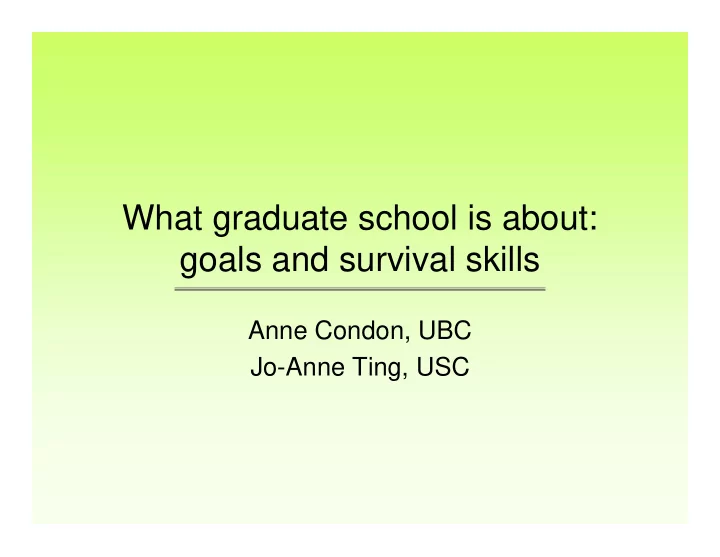

What graduate school is about: goals and survival skills Anne Condon, UBC Jo-Anne Ting, USC
Redefining success • Class performance is not as important as before • Critical and creative thinking are essential – Need strong evaluation skills – No “correct” answer! • Research = discovering new ideas – Advisors don’t know the answer either – BUT they have the skills & experience to help YOU find it
Outline • How to succeed in grad school • How to overcome common issues
Do good research • Learn from all aspects of grad school – Class discussions & projects: basic research skills – Seminars: critical analysis – Peers & colleagues: sounding board for ideas • Research is a perpetual learning process – a result may reveal more questions than answers – Inspirations for new ideas while working on current one
Manage your time • Take charge of your time – Prioritize – Eliminate context-switching overhead • Prioritize – Decide what is most important – Make time to think about and do research! • Eliminate context-switching overhead – Allocate enough time per task to amortize the overhead – For TA duties, respond to emails in batches, rather than being interrupt-driven – For research, allocate several contiguous hours & eliminate distractions
Communicate technical material well • Distill complex ideas down to a few clear, concise statements – Teach (TA) – Volunteer to present in seminars • Learn how to make & deliver presentations – Practice, practice, practice – Prepare the “elevator pitch” (1, 5 and 15 minutes)
Select courses and profs strategically • Choose course content to: – Satisfy breadth requirements – Get project experience similar to research projects – Learn about other areas you might want to do research in! • Select professors by: – Taking courses with potential advisors: impress them! – Talking with their students to find out their styles
Plan for milestones • Map out a timeline with your department’s milestones – Include deadlines for completion of courses, qualifying exams, choosing an advisor, thesis completion, etc. – Budget extra time for reaching some milestones • If you anticipate you won’t reach a milestone, let someone you trust know as early as possible . If you know beforehand, workarounds can be made.
Not that you expect to, but... • Sometimes unanticipated situations arise when working closely with others... • Consensual relationships with faculty are risky, due to inherently unequal positions of power – Best case scenario: • not a good forum for experiencing & evaluating a relationship – Worst case scenario: • uncomfortable at best • may color what other faculty think of you • the faculty won’t leave • may compromise your career
Outline • How to succeed in grad school • Some common issues and how to overcome them
Adjusting to grad school • Everybody arrives with different strengths & experiences – But really, they are all in the same boat • Grad school is very “bursty” – At times, it will demand enormous amounts of time – Give yourself time to recover between the bursts
Making it “click” • Different people will “click” with different research areas, advisors, and peers – when it clicks: • you’re passionate about what you’re working on • you’re good at it • you enjoy the people you’re working with • You might need to explore several different areas and advisors before it “clicks” – Don’t be afraid to change things if it’s not working out – Bringing in a co-advisor may be enough!
Growing as a researcher • A major transition happens in grad school (often year 3) – Classes are finally done – Now, you have to define your own research agenda – Self-driven schedule • Having a good support network will smooth this transition – Build relationships with mentors during first 2 years – Turn to them for support and inspiration – Re-introduce structure to your environment • reading groups • monthly social lunches to build a sense of community with peers
The advisor/advisee relationship • Best case: life-long friendship and collaboration – Many success stories like this – Research community foundation is built on it • Sometimes, the relationship needs work to work – You can and should take steps to make it better – Advisors are almost always willing to help -- but you may need to help them realize that it’s needed • Sometimes, it won’t work out – Bad chemistry – Switching advisors is the right thing in this case
Managing the relationship • Your advisor is as human as you – They have personality flaws, quirks and are over-extended • Be proactive! – Meet regularly – Talk about process and expectations as well as research – Talk especially when you feel “lost” or frustrated • Other people / places can help too: – Find a coadvisor – Discretely talk to faculty and grads to get constructive suggestions – Internships can give “fresh perspective”and experience with success – Campus counseling services
You are in charge of your graduate career... • You need to make things happen • You CAN make things happen – and if you need it, help is there. Use it! • Good luck! You’ll do great!
Recommend
More recommend